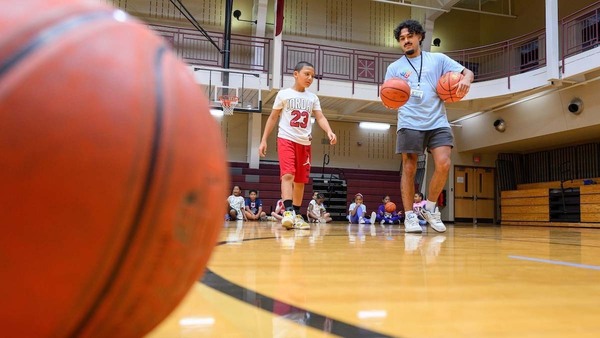The Commencement of the Graduate School class of 2025

Teresa Lambe, a world-renowned vaccine scientist who played a critical role in the fight against COVID-19, delivered the keynote address Saturday (May 17) during the Graduate School’s annual commencement ceremony.
Amid cool, breezy and occasionally sunny conditions at Notre Dame Stadium, Lambe, who co-designed the Oxford/AstraZeneca COVID-19 vaccine, asked graduates to summon the spirit and tenacity implied in the nickname “Fighting Irish,” find a purpose in life and “keep your eyes on it.”
“Purpose needs focus. It needs fire. It needs you to choose — again and again — to walk toward what you value, what you hold dear, not just what is offered.”
And with any luck, she said, others will walk with you.
“The work I’ve done over the past decade, and especially in 2020 designing and delivering a vaccine which saved more than 6 million lives, has been deeply collaborative. It took teams across continents, time zones, with very different accents, very different opinions, all pulling in the same direction. And that kind of unity, that diversity of thought, was our superpower.”
And yet, “Sometimes that type of collaboration isn’t celebrated enough and sometimes we seek to reduce people through labels,” she said. “I’ve often been called a ‘female scientist,’ as though my chromosomes should precede my contributions. But here’s the truth: I am a scientist. Full stop. You don’t need to label what I am to validate it. Labels can be lazy, they can be reductionist. What we need are conversations. Collaborations. Courage.”
In addition to co-designing the Oxford/AstraZeneca vaccine, Lambe led the preclinical studies and spearheaded the laboratory research required for regulatory approval of the lifesaving jab.
As the Calleva Head of Vaccine Immunology at the University of Oxford, Lambe focuses her research on developing and testing vaccines against a number of biodefense pathogens, including Ebola virus, Marburg virus disease and coronaviruses.
A passionate advocate for women in STEM fields, she also seeks to support future leaders through the Teresa Lambe Bursary Fund established in her hometown of Kilcullen, Ireland.
“I’ve made a career fighting invisible enemies — tiny but mighty threats, viruses that don’t care for borders. And I’ve seen what humans can do when we put ego aside and pull together,” she said, adding, “The world doesn’t just need smarter people. It needs wiser and kinder ones. People who are not afraid to lead, and just as willing to listen, and are working for a greater good.
“That’s the kind of graduate Notre Dame produces.”
In introducing Lambe, John T. McGreevy, the Charles and Jill Fischer Provost of Notre Dame, praised her as someone whose “work is fueled not just by intellect and scientific curiosity, but by a genuine care for humanity and a dedication to protecting the most vulnerable among us.”
“Her career stands as a powerful reminder that rigorous scholarship, when combined with compassion and courage, can change the world,” McGreevy said.

Following Lambe’s remarks, University President Rev. Robert A. Dowd, C.S.C., presiding over his first commencement ceremony since taking office last summer, oversaw the conferral of degrees.
He also delivered the charge to the class, recalling his time as a graduate student.
“From personal experience, I know that the journey of a graduate student can be filled with ups and downs, triumphs and tribulations: periods of clarity and periods of doubt, moments of insight and of murkiness,” he said.
“But, here you are. Your persistence and hard work have brought you to this moment.”
For their contributions to Notre Dame, Father Dowd thanked the graduates, noting, “Thanks to the work of so many — including my predecessor, Father John Jenkins; our incredible faculty and administrators; and all of you — the strength of our research programs has risen to new heights, to us being one of the great research institutions of North America.”
He continued, “In your time with us, you have contributed to important breakthroughs, enriched our campus community, and, in many ways, built bridges across disciplines, embodying the unity of truth and knowledge in how you live and work together.
“We are so grateful, so grateful for what you have given here, and so very, very proud to call you our graduates.”
Saturday’s ceremony also featured Michael Hildreth, associate provost and vice president for graduate studies and dean of the Graduate School, and Darren T. Dochuk, the Andrew V. Tackes College Professor of History and the William W. and Anna Jean Cushwa Co-director of the Cushwa Center for the Study of American Catholicism. Hildreth opened the convocation, welcoming students, faculty, staff and visitors and introducing the platform party. Dochuk, one of two winners of this year’s Rev. James A. Burns, C.S.C., Award, delivered the invocation.
Father Dowd delivered the benediction.
Commencement activities conclude Sunday (May 18) with the undergraduate Commencement Ceremony, where Lambe will be recognized as one of six honorary degree recipients. For more information, visit commencement.nd.edu.
Contact: Erin Blasko, associate director of media relations, 574-631-4127, eblasko@nd.edu
Latest ND NewsWire
- No credit history? You might have another way to prove creditworthinessNew research from Notre Dame marketing professor Joonhyuk Yang reveals how retail transaction data can be used to create reliable credit scores for individuals without formal credit histories.
- Sports program promotes health and wellness, offers life lessons to Robinson Center youthAs part of its annual Summer Scholars & Day Camp program, the Notre Dame Robinson Community Learning Center is using sports to promote health and wellness and offer life lessons to area youth.
- Twenty-two Notre Dame students selected for 2025-26 Fulbright U.S. Student ProgramTwenty-two University of Notre Dame students have been named finalists for the 2025-26 Fulbright U.S. Student Program, with another seven singled out as alternates for the award. The finalists include 18 undergraduate students and four graduate students.
- Women of African ancestry may be biologically predisposed to early onset or aggressive breast cancersResearch from the University of Notre Dame is shedding light on why Black women are likely to have early-onset or more aggressive subtypes of breast cancer. The study published in iScience found that a population of cells in breast tissues, dubbed PZP cells, send cues that prompt behavioral changes that could promote breast cancer growth.
- First impressions count: How babies are talked about during ultrasounds impacts parent perceptions, caregiving relationshipPsychologist Kaylin Hill studied the impact of a parent’s first impression of their baby during an ultrasound exam. The words used by the medical professional to describe the baby (positive or negative) influence how the parents perceive their baby, relate to them after they're born and even how that child behaves as a toddler. The research has broad implications for how we train medical professionals to interact with expectant parents, as well as how we care for parents during the perinatal period when they are most susceptible to depression.
- Researchers at Notre Dame detect ‘forever chemicals’ in reusable feminine hygiene productsWhen a reporter with the Sierra Club magazine asked Graham Peaslee, a physicist at the University of Notre Dame, to test several different samples of unused menstrual underwear for per- and polyfluoroalkyl substances (PFAS) in 2019, the results fueled concern over chemical exposure in feminine hygiene products — which ultimately ended up in a $5 million lawsuit against the period and incontinence underwear brand Thinx. Then in 2023, the New York Times asked Peaslee to test 44 additional period and incontinence products for PFAS, a class of toxic fluorinated compounds inherently repellent to oil, water, soil and stains, and known as “forever chemicals” for their exceptionally strong chemical and thermal stability. Measurable PFAS were found in some layers of many of the products tested — some low enough to suggest the chemicals may have transferred off packaging materials, while others contained higher concentrations, suggesting the chemicals were intentionally used during the manufacturing process. In the meantime, another group of researchers published a study that found PFAS in single-use period products, leading Peaslee and his lab to widen their investigation into all sorts of reusable feminine hygiene products — often viewed as an eco-friendly option by consumers. Now, the results of that study have been published in Environmental Science & Technology Letters.













